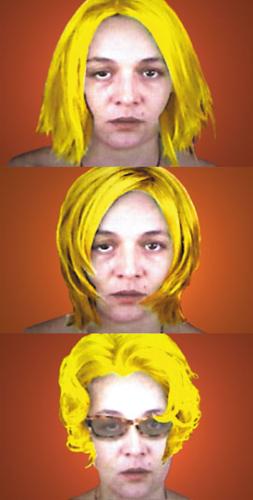Nueva/vista
dal 9/4/2003 al 1/6/2003
Segnalato da
Angie Bonino
Ivan Esquivel
Eduardo Villanes
Alvaro Zavala
Ximena Cuevas
Edgar Endress
Katia Lund
Andres Burbano
Gustavo Romano
9/4/2003
Nueva/vista
Ifa-gallery, Stuttgart
For decades now Latin American video artists have been successful at every major international festival and are represented at exhibitions and in large museum collections. Festivals of video art and other new media have long since been established in many South American metropolises.

video art from latin america
Angie Bonino, Iván Esquivel, Eduardo Villanes, Alvaro Zavala (Peru); Ximena Cuevas (Mexico); Edgar Endress (Chile); Kátia Lund (Brazil); Andrés Burbano (Colombia); Gustavo Romano (Argentina)
For decades now Latin American video artists have been successful at every major international festival and are represented at exhibitions and in large museum collections. Festivals of video art and other new media have long since been established in many South American metropolises. For almost twenty years São Paulo has spearheaded this development with its festival, 'Videobrasil' which offers a broad platform for the presentation of international (and of course Latin American) video art.
Lima, the capital of Peru, is the venue of an equally traditional, though less well known, annual video art festival, the 'Festival Internacional de Video/Arte/Electrónica', co-ordinated by the non-commercial cultural organisation 'Alta TecnologÃa Andina (ATA)'. Its director, José-Carlos Mariátegui, has curated the NUEVA / VISTA exhibition. ATA promotes the development and distribution of the electronic media which have helped considerably to promote video art not only in Peru, but in all Latin American countries. The 'ATA Festival took place in 2002 for the sixth time. As well as videos from around the world, it presented an increasing number of domestic productions from the rapidly expanding video art scene in Peru. 'NUEVA / VISTA' shows examples for the first time in Germany.
The Peruvian video artists Angie Bonino, Iván Esquivel ('Plaztikk'), Eduardo Villanes and Alvaro Zavala ('Castor Andino') have long since been active internationally. They and the other Latin American artists introduced here express themselves by very different methods - Iván Esquivel with reduced graphics; Eduardo Villanes and Alvaro Zavala with 'documentary fiction', and Angie Bonino in a deliberately terse, minimalist formal language. Despite these differences, they are united in their more or less intensive concern about the political developments in Peru. This is particularly obvious in Alvaro Zavala's tapes with their tourist, folklorist images that have formed our notion of his country Peru until today.
In addition to the main focus of NUEVA / VISTA on Peruvian video art, the exhibition also introduces artists from other South-American countries whose videos deal with the cultural, social and political reality of their societies. They show another, a new view of 21st-century Latin America - at times also an ironic view.
The Mexican artist Ximena Cuevas, a selection of whose video productions have been acquired by the Museum of Modern Art in New York, takes us on a fictitious journey of 'Medias Mentiras', or 'half lies', through Mexico City. Andrés Burbano's video also shows his home town: his 'Symphony of Entropy' is an artistic portrait of Colombia's capital Bogotá as a surrealistic composition with fast cuts which presents a critical analysis of the city's present situation. Edgar Endress, with his two-part 'La Memoria de los Caracolas' (Snails' Memory), interprets the experience of the Chilean military dictatorship. In her video 'A Minha Alma' (In my Soul), which won her several prizes, the Brazilian film director Kátia Lund, however, uses the stylistic means of the video clip to highlight how the people in the slums of Rio de Janeiro are sinking deeper and deeper into poverty and are resorting to more and more violence. Argentina's famous media artist Gustavo Romano's working process is probably the one best described as 'interdisciplinary': his methods range from video installations and video sculptures to photographs on internet sites. With his installation 'Pequeños Mundos Privatos' (Small Private Worlds), he brings us back to ourselves and the question of our own identity.
Image: Ximena Cuevas: marca registrada (Schutzmarke)
Opening: April 10, 2003, 6 p.m.
ifa-gallery
Charlottenplatz 17
70173 Stuttgart
phone +49.711.2225.173
fax +49.711.2225.194 Opening hours
Tuesday to Friday 12 am to 6 pm
Saturday, Sunday 11 am to 4 pm
Admission free



